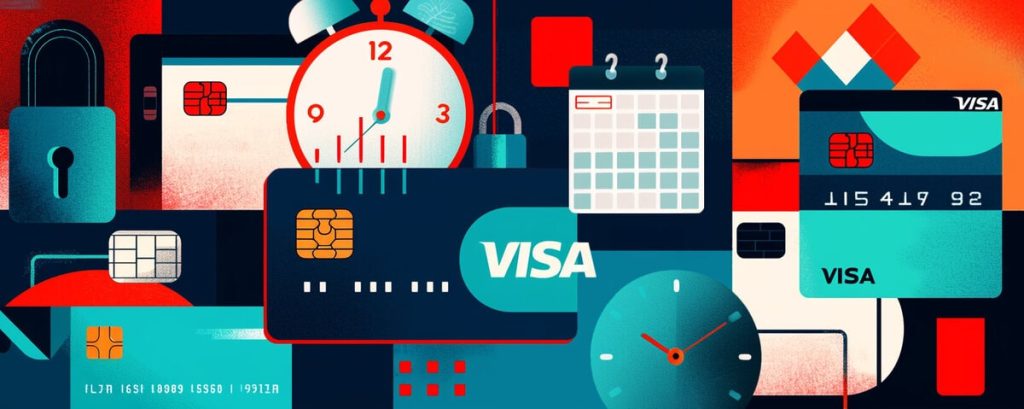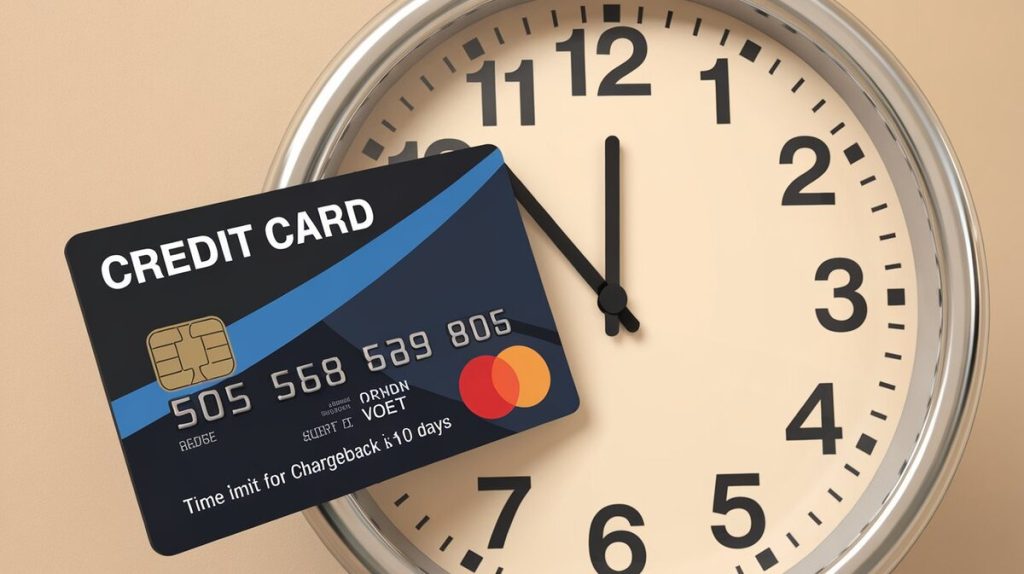A chargeback is a tool that lets cardholders dispute transactions and request refunds. Chargeback time limits define how long consumers and merchants have to act. This article will focus on the different chargeback time limits set by Visa, Mastercard, American Express, and Discover. We’ll also cover how merchants can respond and prevent disputes.
What is a Chargeback?
A chargeback allows cardholders to reverse a transaction if a dispute arises. Cardholders initiate chargebacks by contacting their bank, which then reviews the claim. If the claim is valid, the bank issues a refund and debits the merchant.
Chargebacks come with strict time limits that vary depending on the credit card network and transaction type. Understanding these limits is essential for both consumers seeking refunds and merchants defending against disputes.
Chargeback Time Limits by Network
Visa Chargeback Time Limits
Visa offers 120 days from the transaction date for most disputes. Exceptions exist, like fraud cases, where the limit drops to 75 days.
- Standard Time Limit: 120 days.
- Fraud-related Chargebacks: 75 days.
- Merchant Response Time: 20 days for most disputes, and 10 days for arbitration.
Table 1: Visa Chargeback Time Limits
| Transaction Type | Cardholder Time Limit | Merchant Response Time |
|---|---|---|
| Fraudulent Transactions | 75 days | 20 days |
| Standard Disputes | 120 days | 20 days |
| Arbitration Cases | 120 days | 10 days |
Visa merchants have limited time to defend disputes. If a dispute progresses to arbitration, a decision is often final.
Mastercard Chargeback Time Limits
Mastercard also uses a 120-day window for most disputes but reduces it to 45 days for issues like lost cards.
- Standard Time Limit: 120 days.
- Account-Related Issues: 45 days.
- Merchant Response Time: 45 days for all dispute types.
Table 2: Mastercard Chargeback Time Limits
| Transaction Type | Cardholder Time Limit | Merchant Response Time |
|---|---|---|
| Fraudulent Transactions | 120 days | 45 days |
| Lost Card | 45 days | 45 days |
| Transaction Discrepancies | 120 days | 45 days |
Merchants using Mastercard also have 45 days to respond to a dispute. Exceptions apply to certain transactions, but the general guideline holds for most.

American Express Chargeback Time Limits
American Express cardholders have 120 days to file disputes, and merchants have 20 days to respond.
- Standard Time Limit: 120 days.
- Merchant Response Time: 20 days for most disputes.
Table 3: American Express Chargeback Time Limits
| Transaction Type | Cardholder Time Limit | Merchant Response Time |
|---|---|---|
| Damaged or Defective Goods | 120 days | 20 days |
| Non-receipt of Services | 120 days | 20 days |
| Arbitration Cases | 120 days | 20 days |
American Express manages its own network and issuing bank, so it offers a streamlined process with fewer intermediaries.
Discover Chargeback Time Limits
Discover’s limits can vary. Most disputes need to be filed within 120 days, with exceptions for specific reasons.
- Standard Time Limit: 120 days.
- Merchant Response Time: 20-30 days, depending on the dispute type.
Table 4: Discover Chargeback Time Limits
| Transaction Type | Cardholder Time Limit | Merchant Response Time |
|---|---|---|
| Standard Disputes | 120 days | 30 days |
| Fraud-related Transactions | 120 days | 30 days |
Discover offers flexibility but generally sticks to a 120-day window for filing disputes.
Merchant Response Times
Merchants need to respond quickly when a chargeback is filed. Each card network has its own deadlines for merchants, usually ranging from 20 to 45 days. If merchants miss these deadlines, they risk losing the dispute automatically.
Common Merchant Response Times:
- Visa: 20 days for most disputes, 10 days for arbitration.
- Mastercard: 45 days.
- American Express: 20 days.
- Discover: 20-30 days, depending on the dispute type.
Table 5: Merchant Response Time Limits by Network
| Network | Merchant Response Time |
|---|---|
| Visa | 20 days |
| Mastercard | 45 days |
| American Express | 20 days |
| Discover | 20-30 days |
The response time is measured from the moment the chargeback is filed, not when the merchant receives notification. Merchants should closely monitor disputes and act immediately upon receiving a notification.
Special Circumstances for Chargebacks
In some cases, chargeback time limits may be extended. For example, during natural disasters or other major disruptions, banks or card networks may offer extensions to accommodate consumers. However, such extensions are rare and are not guaranteed by law.
In cases involving fraud or unauthorized transactions, some banks may allow longer timeframes for filing disputes. However, this depends on the bank’s policies and should not be relied upon.

Chargeback Prevention
For merchants, preventing chargebacks is crucial to maintaining a healthy business. Chargebacks can result in lost revenue, higher processing fees, and damage to a merchant’s reputation. Effective chargeback prevention strategies can mitigate these risks.
Merchanto.org, an official partner of Visa and Mastercard, offers chargeback prevention tools that help merchants manage disputes and reduce chargebacks. Merchanto.org provides solutions designed to help businesses address disputes proactively and avoid chargeback penalties. Learn more about their services here.
Key Prevention Strategies for Merchants:
- Good customer service: Resolve disputes directly with customers before they escalate into chargebacks.
- Clear return policies: A well-defined return policy can prevent disputes over non-delivered or defective goods.
- Prompt responses: Respond to chargeback notifications immediately. Time is critical, and failure to respond within the limit can result in automatic losses.
- Documentation: Keep accurate records of all transactions and communications with customers. This helps in building a defense during disputes.
How to Manage Chargebacks
Both consumers and merchants must stay informed about chargeback rules. For consumers, understanding the time limits for filing disputes can help recover funds faster. For merchants, responding within the time limits is crucial to maintaining a good standing with payment processors.
For Consumers:
- File disputes early: Don’t wait until the deadline approaches to file a dispute. The earlier a dispute is filed, the quicker it can be resolved.
- Keep documentation: Save receipts, invoices, and any communication with merchants. These documents help when filing a dispute.
- Contact the merchant first: Many disputes can be resolved without filing a chargeback. Contact the merchant directly before initiating a dispute.
For Merchants:
- Monitor chargebacks: Stay on top of chargeback notifications. Failing to respond in time can result in lost revenue.
- Use prevention tools: Consider tools to prevent chargebacks before they happen.
- Provide evidence: When responding to a chargeback, provide all relevant documentation to support your case. This includes proof of delivery, receipts, and communication records with the customer.
Conclusion
Understanding chargeback time limits is essential for both consumers and merchants. Credit card networks generally allow a 120-day window for filing disputes, but exceptions exist. Merchants must respond within 20 to 45 days, depending on the network.
By taking proactive steps, staying informed about deadlines, and using prevention tools merchants can minimize the risks associated with chargebacks. Consumers, on the other hand, should ensure they file disputes within the allowed time frame and keep documentation to support their claims.
This guide provides clear, practical advice for navigating the chargeback process, based on data from leading card networks like Visa, Mastercard, American Express, and Discover. Understanding the rules and acting within the limits can make a big difference in the outcome of disputes.
This article uses data and guidelines from official sources like Visa, Mastercard, American Express, and Discover. Trusted platforms like Checkout.com and Stripe.com also provide valuable insights on payment processing and chargeback management. The tables included offer a quick reference for chargeback time limits and response deadlines, helping merchants and consumers act promptly and within the specified timeframes.



